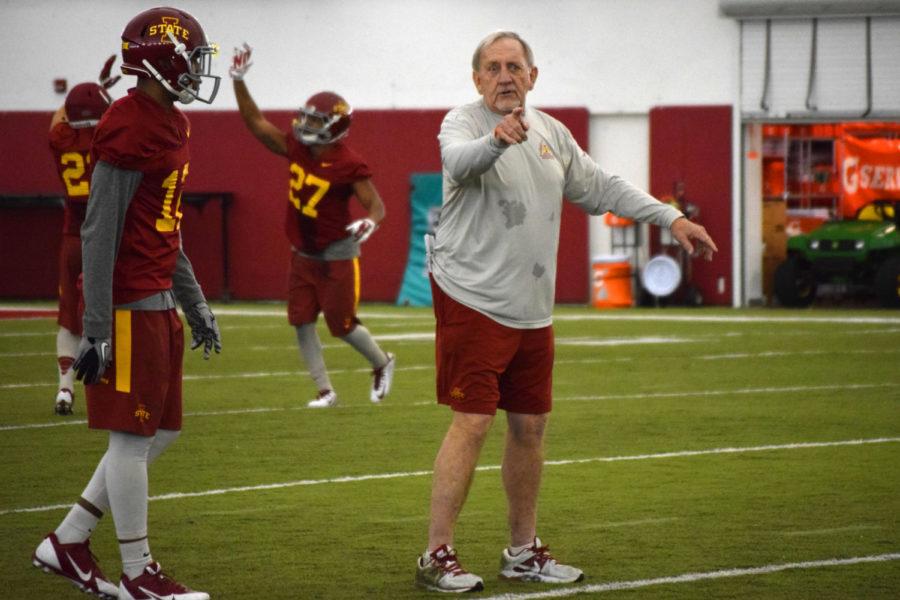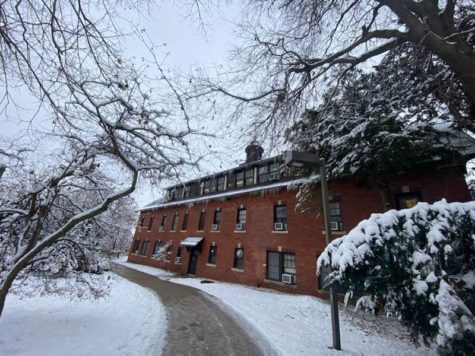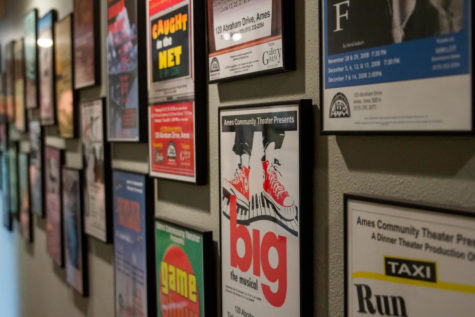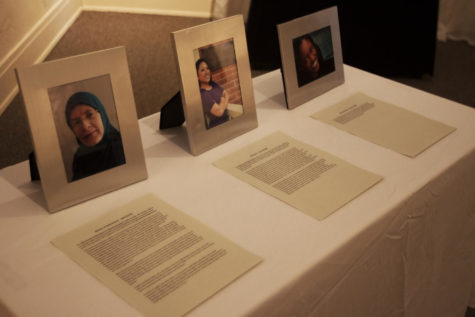The road less traveled: ISU football player Jarnor Jones uses military experience at Iowa State
Redshirt junior defensive back Jarnor Jones talks to defensive coordinator Wally Burnham during a drill on the first day of spring practice.
September 4, 2015
Jarnor Jones is no stranger to tough decisions. From choosing between basketball and football to choosing his collegiate path, he’s had to deal with them all his life.
But perhaps one of his toughest decisions came after his redshirt freshman season at North Carolina State. His lack of discipline and chemistry with the coaching staff left Jones with a question.
Should he stay or should he go?
“For me, it was just hard mentally,” Jones said. “I didn’t want to go through all of [the transfer process]. I just wanted to stay [Division I], but it came to a point where I knew I had to do something.”
Twists and turns consumed Jones’ life from his time in high school, so overcoming change and adversity wasn’t something he was unfamiliar with.
A native of Lithonia, Ga., Jones attended Martin Luther King, Jr. High School with a primary focus on basketball. For his part, that path was coming along nicely, as he averaged 13.1 points per game in his career.
But entering his senior year, he took on something that would lead him down a path he couldn’t have envisioned in years prior: a path to the gridiron.
Former high school coach Mike Carson talked to Jones about joining the football team. In Jones’ only season on the team, it went 12-2, including an undefeated record in conference play.
Although he had only played football for a short time, Jones rose on college recruiting boards across the nation. So much so, he decided to pursue football instead of basketball collegiately because of the rising number of possibilities.
At the end of his high school career, ESPN ranked him the 28th best safety in the nation and the 58th best player in Georgia.
Jones narrowed his choices to some prestigious Power Five teams, including Texas Christian, West Virginia, Kentucky and North Carolina State. It was N.C. State that eventually won his heart and beckoned him down the road to Raleigh, N.C.
Jones redshirted his opening season because of a deep safety position on a Wolfpack team that would eventually finish 8-4, losing to Vanderbilt in the Music City Bowl.
Just before the final game of the season, the coach who recruited him, Tom O’Brien, was relieved of his duties. N.C. State replaced him with Dave Doeren, the former Northern Illinois coach who played football for Drake.
The coaching change didn’t sit right with Jones and left him pondering his options.
“The new coaches that came in — just the chemistry wasn’t there, and I just had to open up my recruitment,” Jones said.
Jones now had a choice to make: stay at N.C. State and play under a coaching staff he wasn’t familiar with and maybe deal with lack of playing time or move on to someplace new.
Despite his desire to continue Division I football, he chose to move on. The question remained: Where would his destination be?
“I didn’t want to leave because it was my first-choice school, and I think that I could have made an impact there,” Jones said. “I knew my talent, and I knew that I could do something somewhere else.”
Many junior colleges across the nation clamor for a transfer from the ACC, so the answer seemed easy enough: attend a powerhouse junior college. But it wasn’t that simple.
During his short time at N.C. State, Jones realized he had a discipline problem. He would show up to practice just a little late and didn’t have the level of preparation he knew he needed.
“Just for me personally, I knew that I needed a culture change, an environment change,” Jones said. “Coming from high school to a Power Five school, which is huge, I just didn’t take it serious.”
Because of his discipline issues, Jones had to rethink his transfer process. One of his choices was Middle Tennessee State, but he knew he yearned for more structure than the school could provide.
That’s when he came across Georgia Military College, a destination that could quench the thirst Jones had for discipline.
The school didn’t wait to help Jones acclimate. When he enrolled, Jones was put into a “P-program.” Every morning for six weeks, Jones had to wake up at 6:30 a.m. to clean the parking lots and the hallways.
“It was new,” Jones said. “It was a whole like a [180-turn] from going from a regular person to a military person. Discipline is what they hammer in you.”
The football culture emulated that discipline, with the players often waking up in the wee hours of the morning for road games. In their uniforms, the student-athletes would eat their share of food before the long trips to rival venues.
The coach, Bert Williams, was much like a military man in Jones’ eyes. His attitude at games and practices mimicked one of a drill sergeant.
“I’m not sure [if he was a drill sergeant], but he sure could’ve been,” Jones joked.
Georgia Military did its job for Jones, who actively praises the school for his current success.
“It was just an adjustment I made, and I couldn’t be any happier [about] going through there,” Jones said.
After a successful season with Georgia Military, and one where he adapted a new mentality on life, Jones had to think about moving on once again. He knew he wanted to be back on a Power Five team.
The recruiting didn’t go the way Jones wanted it to because he didn’t fit into the stereotypical role of a linebacker or safety. He played the nickel position with Georgia Military, putting him in a unique position as a recruit — one where teams with special formations would give him a look.
Late in the process, ISU coach Paul Rhoads laid eyes on Jones, understood he could be a dynamic player on defense and knew he would fit into the ISU scheme in the upcoming season.
“He’s what we like to recruit,” Rhoads said. “He’s a fun football player to watch. I love the length that he brings to our team on the perimeter.”
Jones will settle into a nickel role for the Cyclones, calling himself a “rover,” depending on the formation.
Thus far, he is fitting into the defense well and has settled into his role.
“[Jones] is a fun player to watch,” Rhoads said. “He’s benefiting from [military school]. Right now, we are the recipient of where it took him.”
Jones isn’t just impressing the coaches. The players around him have taken notice, especially of his long frame and quickness.
“He’s fast, he’s long, he’s physical,” said linebacker and captain Levi Peters. “He brings a lot to the defense.”
And his military background is rubbing off on his teammates, even if it’s only a coincidental influence.
Some teammates didn’t even know he went to Georgia Military, but they can see the disciplined nature arise during the preseason. For Peters, it’s given him a spark of inspiration.
“I see how much his attitude changed and that’s inspiring,” Peters said. “I see a guy who wants to learn, who doesn’t want to screw up, who gets mad at himself when he screws up and knows the defense can’t afford that.”
Jones will be playing in front of the biggest crowd of his life Saturday against University of Northern Iowa — 61,500, a sellout. His eyes widened when he found out about the attendance, his mouth bending into a crooked smile.
“Seize the moment,” Jones said. “I belong here, that’s how I feel, not to be arrogant. I just feel like I belong here. I’m not trying to make it bigger than it is. I’m not making it smaller than it is.
“But it’s show time on Saturday.”

















